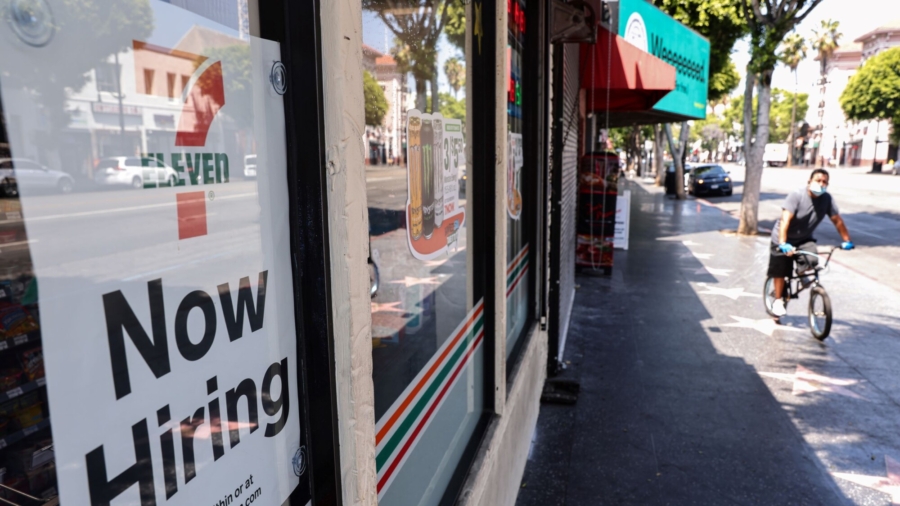The number of Americans filing for unemployment fell last week to near a pandemic-era low in a sign of ongoing labor market recovery.
Initial filings for unemployment insurance, a proxy for layoffs, came in at 375,000 for the week ending Aug. 7, a drop of 12,000 over the previous week’s revised level of 387,000, the Labor Department said in a release (pdf). Initial claims hit a pandemic-era low of 368,000 in the week ending July 10 before ticking back up.
While the drop in jobless claims reflects the dynamics of a rebounding economy, the number remains well above the pre-pandemic weekly average of around 220,000, suggesting the employment recovery still has a ways to go.
“Welcome improvement is seen with the new jobless claims numbers, essentially in line with expectations,” Bankrate senior economic analyst Mark Hamrick said in an emailed statement to The Epoch Times.
Economists polled by Reuters predicted 375,000 initial filings. At the height of the pandemic-driven lockdowns last spring, initial jobless claims hit a series record of over 6 million.
“Of course, new claims reflect recent job loss, rather than the pace of hiring as such,” Hamrick said, adding, “the newly unemployed who are inclined to work should face generally positive prospects, an employment safety net, so to speak.”
Job openings in the United States surged to a record high of more than 10 million in June, while hiring lagged behind that figure by over 3 million, painting a picture of an economic recovery being held back by business hiring difficulties. About 8.7 million people are officially unemployed.
The Labor Department’s Job Openings and Labor Turnover Survey (JOLTS), released Aug. 9, showed that the number of job vacancies jumped by 590,000 to 10.1 million on the last day of June, led by gains in professional and business services, retail trade, and accommodation and food services.
“This is by far the record amount of job openings the economy has ever had. This historically elevated level makes clear that we have a severe worker shortage that threatens what should be a prolonged economic boom,” Curtis Dubay, senior economist at the U.S. Chamber of Commerce, said in a note.
Some Republicans and economists have blamed generous unemployment benefits—in particular, the federal pandemic jobless compensation boost—for sidelining workers by discouraging them from taking jobs. In the face of business hiring woes, some two dozen states have moved to end early their participation in the extended federal unemployment programs.
Clouding the prospects for continued labor market recovery are fears that rising COVID-19 cases driven by the Delta variant could have a cooling effect on the economy.
“On the downbeat side of the ledger, restaurant reservations and airline travel appear to be seeing some impacts from the surge in the Delta variant, which could weigh on economic activity here in the second half of the year,” Hamrick said. “These impacts could be quickly reversed if we see a substantial easing in the case numbers.”
Still, there are other indications of solid improvement in the job market, including the recent drop in the unemployment rate to 5.4 percent and steady hiring reflected in payrolls gains over the past two months. The Labor Department’s jobs report, released Aug. 6, showed that nonfarm payroll employment rose by 943,000 in July, topping the 850,000 jobs U.S. employers added in June—a sign that the economy enjoyed a solid burst of job growth.
The labor market recovery has a long way to go, however. While economic output has fully bounced back to its pre-pandemic levels, the employment recovery is trailing. After shedding 22.4 million jobs in the first two months of the pandemic, the U.S. economy has recovered around 15.6 million jobs since May of last year.
From The Epoch Times

